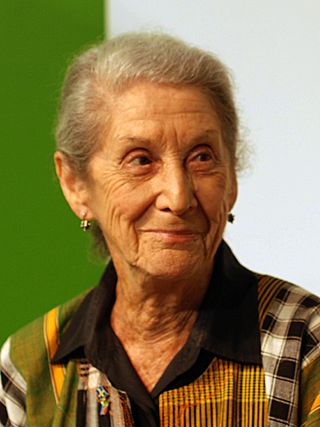
Nadine Gordimer was a South African writer and political activist. She received the Nobel Prize in Literature in 1991, recognised as a writer "who through her magnificent epic writing has ... been of very great benefit to humanity".

Hendrik Frensch Verwoerd, also known as H. F. Verwoerd, was a Dutch-born South African politician, scholar in applied psychology, philosophy, and sociology, and newspaper editor who was Prime Minister of South Africa and is commonly regarded as the architect of apartheid and nicknamed the "father of apartheid". Verwoerd played a significant role in socially engineering apartheid, the country's system of institutionalized racial segregation and white supremacy, and implementing its policies, as Minister of Native Affairs (1950–1958) and then as prime minister (1958–1966). Furthermore, Verwoerd played a vital role in helping the far-right National Party come to power in 1948, serving as their political strategist and propagandist, becoming party leader upon his premiership. He was the Union of South Africa's last prime minister, from 1958 to 1961, when he proclaimed the founding of the Republic of South Africa, remaining its prime minister until his assassination in 1966.

Pieter Willem Botha, was a South African politician. He was the head of government of South Africa from 1978 to 1989, serving as the last prime minister of South Africa from 1978 to 1984 and the first executive state president of South Africa from 1984 to 1989.

The National Party, also known as the Nationalist Party, were a political party in South Africa from 1914 to 1997, which was responsible for the implementation of apartheid rule. The party was an Afrikaner ethnic nationalist party, which initially promoted the interests of Afrikaners but later became a stalwart promoter and enactor of white supremacy, for which it is best known. It first became the governing party of the country in 1924. It merged with its rival, the SAP, during the Great Depression, and a splinter faction became the official opposition during World War II and returned to power. With the National Party governing South Africa from 4 June 1948 until 9 May 1994, the country for the bulk of this time was only a de jure or partial democracy, as from 1958 onwards non-white people were barred from voting. In 1990, it began to style itself as simply a South African civic nationalist party, and after the fall of apartheid in 1994, attempted to become a moderate conservative one. The party's reputation was damaged irreparably by perpetrating apartheid, and it rebranded itself as the New National Party in 1997 before eventually dissolving in 2005.

General Magnus André de Merindol Malan was a South African military figure and politician during the last years of apartheid in South Africa. He served respectively as Minister of Defence in the cabinet of President P. W. Botha, Chief of the South African Defence Force (SADF), and Chief of the South African Army. Rising quickly through the lower ranks, he was appointed to strategic command positions. His tenure as chief of the defence force saw it increase in size, efficiency and capabilities.
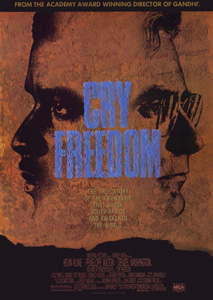
Cry Freedom is a 1987 epic biographical drama film directed and produced by Richard Attenborough, set in late-1970s apartheid-era South Africa. The screenplay was written by John Briley based on a pair of books by journalist Donald Woods. The film centres on the real-life events involving South African activist Steve Biko and his friend Woods, who initially finds him too radical, and attempts to understand his way of life. Denzel Washington stars as Biko, while Kevin Kline portrays Woods. Penelope Wilton co-stars as Woods' wife Wendy. Cry Freedom delves into the ideas of discrimination, political corruption, and the repercussions of violence.
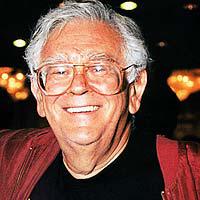
Yossel Mashel Slovo, commonly known as Joe Slovo, was a South African politician, and an opponent of the apartheid system. A Marxist-Leninist, he was a long-time leader and theorist in the South African Communist Party (SACP), a leading member of the African National Congress (ANC), and a commander of the ANC's military wing uMkhonto we Sizwe (MK). Slovo was a delegate to the multiracial Congress of the People of June 1955 which drew up the Freedom Charter. He was imprisoned for six months in 1960, and emerged as a leader of uMkhonto we Sizwe the following year. He lived in exile from 1963 to 1990, conducting operations against the apartheid régime from the United Kingdom, Angola, Mozambique, and Zambia. In 1990, he returned to South Africa, and took part in the negotiations that ended apartheid. He became known for proposing the "sunset clauses" covering the 5 years following a democratic election, including guarantees and concessions to all sides, and his fierce non-racialist stance. After the elections of 1994, he became Minister for Housing in Nelson Mandela's government. He died of cancer in 1995.

André Philippus Brink was a South African novelist, essayist and poet. He wrote in both Afrikaans and English and taught English at the University of Cape Town.
Dieter Felix Gerhardt is a former commodore in the South African Navy and commander of the strategic Simon's Town naval dockyard. He was arrested by the FBI in New York City in 1983 following information obtained from a Soviet defector. He was convicted of high treason as a spy for the Soviets for a period of twenty years in South Africa together with his second wife, Ruth, who had acted as his courier. Both were released prior to the change of government following the 1994 general election.

A referendum on becoming a republic was held in South Africa on 5 October 1960. The Afrikaner-dominated right-wing National Party, which had come to power in 1948, was avowedly republican and regarded the position of Queen Elizabeth II as the South African monarch as a relic of British imperialism. The National Party government subsequently organised the referendum on whether the then Union of South Africa should become a republic. The vote, which was restricted to whites—the first such national election in the union—was narrowly approved by 52.29% of the voters. The Republic of South Africa was constituted on 31 May 1961.
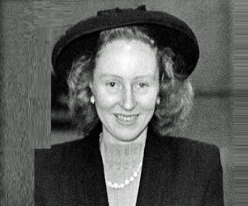
Ruth Williams Khama, Lady Khama was the wife of Botswana's first president Sir Seretse Khama, the Paramount Chief of its Bamangwato tribe. She served as the inaugural First Lady of Botswana from 1966 to 1980.

Country of My Skull is a 1998 nonfiction book by Antjie Krog about the South African Truth and Reconciliation Commission (TRC). It is based on Krog's experience as a radio reporter, covering the Commission from 1996 to 1998 for the South African Broadcasting Corporation. The book explores the successes and failures of the Commission, the effects of the proceedings on her personally, and the possibility of genuine reconciliation in post-Apartheid South Africa.
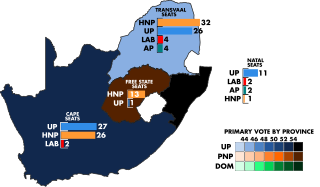
General elections were held in South Africa on 26 May 1948. They represented a turning point in the country's history, as despite receiving just under half of the votes cast, the United Party and its leader, incumbent Prime Minister Jan Smuts, were ousted by the Herenigde Nasionale Party (HNP) led by D. F. Malan, a Dutch Reformed cleric.

The End Conscription Campaign was an anti-apartheid organisation allied to the United Democratic Front and composed of conscientious objectors and their supporters in South Africa. It was formed in 1983 to oppose the conscription of all white South African men into military service in the South African Defence Force.
Rian Malan is a South African author, journalist, documentarist and songwriter of Afrikaner descent. He first rose to prominence as the author of the memoir My Traitor's Heart (1990), which, like the bulk of his work, deals with South African society in a historical and contemporary perspective and focuses on racial relations. As a journalist, he has written for major newspapers in South Africa, Britain and the United States.
Nico Smith was a South African Afrikaner minister and prominent opponent of apartheid. Smith was a professor of theology at the University of Stellenbosch, a member of the Afrikaner Broederbond organization, and a minister of the apartheid-supporting Dutch Reformed Church (DRC). However, he abandoned his upper-class lifestyle to live with the impoverished and segregated blacks of Mamelodi, a township in the east of Pretoria. From Mamelodi, he worked to support the black community and oppose apartheid. Smith joined the Dutch Reformed Church in Africa (DRCA), the separate branch of the Dutch Reformed Church for non-whites, due to the DRC's refusal to oppose apartheid.

There is a wide range of ways in which people have represented apartheid in popular culture. During (1948–1994) and following the apartheid era in South Africa, apartheid has been referenced in many books, films, and other forms of art and literature.

Ah, But Your Land Is Beautiful (1981) is the third and final novel by South African author Alan Paton. Ah, But Your Land is Beautiful is set in the 1950s, after apartheid was established in postwar South Africa. The historical novel explores fictional characters interacting with historical figures working to resist these laws.
Christopher Hope, FRSL is a South African novelist and poet who is known for his controversial works dealing with racism and politics in South Africa. His son is violinist Daniel Hope.

The apartheid regime in South Africa began in 1948 and lasted until 1994. It involved a system of institutionalized racial segregation and white supremacy, and placed all political power in the hands of a white minority. Opposition to apartheid manifested in a variety of ways, including boycotts, non-violent protests, and armed resistance. Music played a large role in the movement against apartheid within South Africa, as well as in international opposition to apartheid. The impacts of songs opposing apartheid included raising awareness, generating support for the movement against apartheid, building unity within this movement, and "presenting an alternative vision of culture in a future democratic South Africa."















